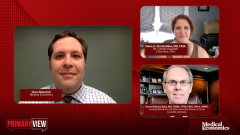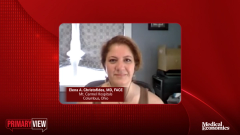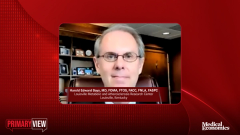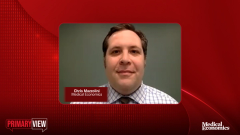
Weight Loss and Patient Support
Closing thoughts regarding the increasing burden of overweight and obesity in the United States, and recommendations for supporting patients who are taking a proactive role in managing their weight.
Episodes in this series

Chris Mazzolini: Dr. Christofides, any closing thoughts or any responses to anything Dr. Bays mentioned? Or anything else you want to mention based on our program?
Elena A. Christofides, M.D., FACE: Yes. I appreciate that Chris. My closing remarks are as follows: Nearly 1 in 2 individuals in the United States has overweight or obesity, and given the rising costs of healthcare as a result of the associated comorbidities, it’s imperative that clinicians get off their high horse. They need to stop thinking that patients can do it all by themselves and that they’re going to address it by themselves. Patients are coming in requesting help. They want help. They want information. And they want education. They’re reliant on their medical practitioner to be their coach, or guide, in this process and they want credible information. They are reading stuff on the internet, but they want you to guide them as to what is the most appropriate path for them because pretending like that in exercise is naive and insane. My plea to clinicians is to stop being so egotistical about the fact that patients are supposed to just go out and figure it out on their own. You are the clinician, so act like one. You are the expert, so pretend like you know what you’re talking about. Your patients want your guidance, so get it. Get that information. Learn the information. And make it a point to have a conversation with every patient about the consequences of their overweight or obesity to help them manage it. Give them the available tools, and have that conversation. All too often I hear, “Well, my doctor told me to diet, but didn’t have any idea what I should do,” or “The clinician is overweight themselves and they’re not addressing it, so they can’t possibly help me.” These are all smokescreens as part of our greater problem with obesity problems in the United States. It’s the last disease that is acceptable to be discriminated against. It’s the last disease that is acceptable for people to throw up their hands in the air and pretend, “Ah, I don’t know what to do. There are so many choices. There’s so much out there. Just go figure it out.” That’s usually what patients express to me when they’re frustrated with their clinicians, from primary care, all the way up to their specialists. Nearly 1 to 2 individuals need help. We have a plethora of options — simple treatments, such as Plenity, to complicated. Diet is complicated. Lifestyle is complicated. And medication management and surgery is complicated. If you’ve ever contemplated surgery for a patient for obesity or overweight, then you owe it to your patient population to know all the things that lead up to that: to give better, informed advice, and to make a true partner of your patient in their lifelong journey to achieve a healthy weight and healthy metabolism.
Chris Mazzolini: Dr. Elena Christofides, and Dr. Harold Bays, thank you both for joining us today. I appreciate it.
Elena A. Christofides, M.D., FACE: Thank you, Chris.
Chris Mazzolini: Thank you to all the clinicians out there for watching this Medical Economics™ primary view program from MJH Life SciencesTM. We hope you found this discussion to be valuable in your clinical practice. Have a great day.
Transcript edited for clarity.
Newsletter
Stay informed and empowered with Medical Economics enewsletter, delivering expert insights, financial strategies, practice management tips and technology trends — tailored for today’s physicians.





